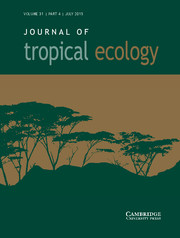Article contents
Soil disturbance by vertebrates alters seed predation, movement and germination in an African rain forest
Published online by Cambridge University Press: 30 September 2011
Abstract:
Biopedturbation, or animal-caused soil disturbance, may be important for development and maintenance of small-scale heterogeneity in ecosystems with the potential to alter seed mortality and recruitment. However, its role in tropical forests has been largely ignored. This study explored effects of vertebrate biopedturbation on seed (1) microsite heterogeneity, (2) predation and (3) germination in a West African rain forest. Exclosure experiments were used to study how biopedturbation altered burial and movements of seeds of four common canopy species. Effect of seed burial on removal by seed predators was also examined. Germination of the dominant canopy species (Raphia palma-pinus) in swamp forest was tested within artificial disturbances mimicking that of a locally common but endangered mammal, the Liberian mongoose (Liberiictis kuhni), which was estimated to turn over the entire forest floor in this habitat in c. 8 mo. Seed exposure to biopedturbation for 20 d (n = 80) led to an overall 6.5-fold increase in small-scale horizontal movement and increased probability of burial (6–52% higher), varying by species. Burial effectively eliminated seed removal for all four species (n = 160) by seed predators over 20 d. Germination of Raphia palma-pinus seeds (n = 100) was enhanced by 17.5% on average over 4 mo in simulated disturbances. Results suggest biopedturbation may be important for seedling recruitment and that loss of species with this functional role could have underappreciated yet important impacts on tropical plant communities.
Keywords
- Type
- Research Article
- Information
- Copyright
- Copyright © Cambridge University Press 2011
References
LITERATURE CITED
- 10
- Cited by


